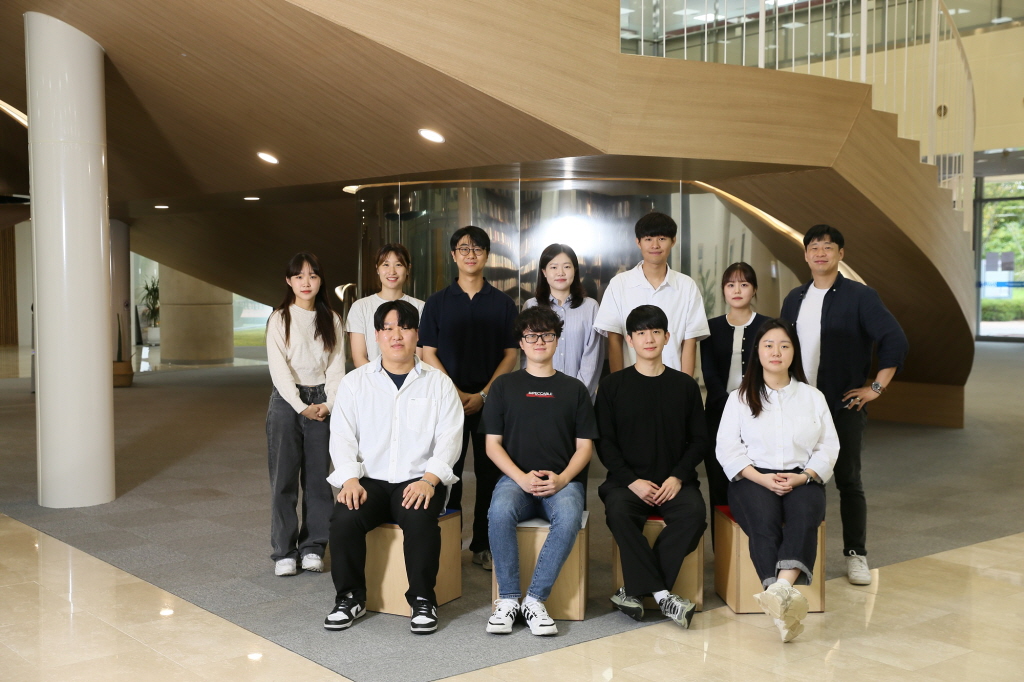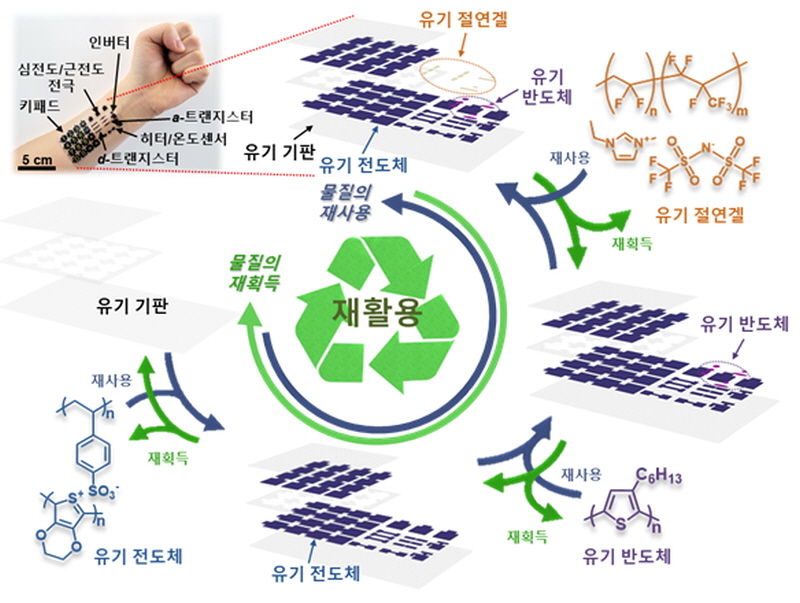UNIST (총장 이용훈) 화학과 심교승 교수팀은 모든 소재를 회수하고 재활용할 수 있는 유기물 기반의 유연한 전자 소자와 웨어러블 기기를 개발했다. 개발된 전자 소자들은 제작부터 재활용에 이르기까지 친환경적이며 경제적인 공정을 도입해 그 효율을 높였다.

▲(뒷줄 오른쪽 첫 번째)이번 연구를 주도한 심교승 교수 연구팀
UNIST 심교승 교수팀, 유기물 기반 전자 소자 개발
다 사용한 전자기기를 재활용해 다른 전자기기로 만들 수 있는 방법이 개발돼 환경 문제 해결과 지속 가능한 미래형 전자기기 산업에 새로운 방향을 제시할 것으로 기대된다.
UNIST (총장 이용훈) 화학과 심교승 교수팀은 모든 소재를 회수하고 재활용할 수 있는 유기물 기반의 유연한 전자 소자와 웨어러블 기기를 개발했다. 개발된 전자 소자들은 제작부터 재활용에 이르기까지 친환경적이며 경제적인 공정을 도입해 그 효율을 높였다.
최근 유기 전자소재를 활용한 웨어러블 전자기기의 활발한 연구 및 기술개발이 진행 중이다.
그에 따라 다양한 유기 전자 폐기물이 늘어나고 있다. 지금까지의 재활용 기술은 LCD 기판에 쓰이는 유리나 전극으로 이용되는 금속과 같은 무기물 소재에만 치중되고 있다.
심교승 교수는 “인체에 무해한 용매로 친환경적이고 경제적인 공정을 활용했다”며 “무기물이 아닌 재활용이 가능한 유기물기반 전자재료만 선별해 유연성 있는 웨어러블 전자기기를 만들었다”고 덧붙였다.
연구팀은 드랍 캐스팅(drop casting)을 활용해 물질 낭비를 최소화하고 다양한 수동소자와 능동소자를 제작했다. 드랍 캐스팅은 용액을 기판 위에 떨어트린 다음 열처리를 통해 막을 형성하는 방법이다.
제작된 유기 전자소재인 유기 전도체, 절연겔, 반도체 등의 재활용성을 평가했다. 유기 전도체의 경우 5번 이상 재활용이 가능했으며, 유기 절연겔의 경우 30번 이상의 재사용, 유기 반도체는 1번 정도 재활용 가능한 것으로 확인됐다.
연구팀은 개발된 재활용이 가능한 유연 전자기기를 바탕으로, 전자 소자들 간에 ‘폐쇄-루프 재활용’을 선보였다. 패쇄-루프 재활용은 제작된 전자기기가 수명이 다하면 그 소재를 재활용해 다른 전자기기로 재구성하는 방식이다. 연구팀은 소재의 선택적 용해를 기반한 재활용 방법을 이용해 물질적 손실 없이 본래의 소자 특성을 완벽하게 이끌어냈다.
심교승 교수는 “이번 연구는 그동안 간과했던 유기 전자재료를 활용한 전자 산업 발달 과정에서 발생하는 환경 문제의 해결방안을 최초로 제시했다”며 “이번 연구 성과는 지속 가능한 미래형 전자기기 산업을 위한 새로운 방향을 제시하는 선도적 결과이자 핵심기술이 될 것으로 기대한다”고 말했다.
박해찬 UNIST 석박통합과정 대학원생이 1저자로 참여한 이번 연구는 세계 최고 권위 국제 학술지 중 하나인 네이처 일렉트로닉스(Nature Electronics) 12월6일에 온라인 게재됐다. 연구 수행은 과학기술정보통신부 한국연구재단 및 울산과학기술원의 지원을 받아 이뤄졌다.

▲재활용 가능한 유기물 기반의 유연성 전자기기 및 재활용 과정
